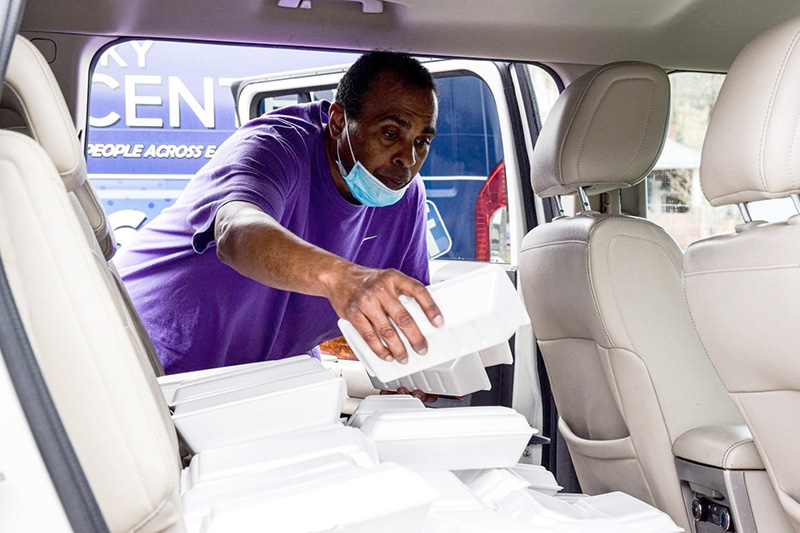The East Kentucky Dream Center empowers families stuck in the cycle of poverty. But what does that look like?
“We build relationships,” explains Rachel Campbell-Dotson, the organization’s executive director. Sometimes the relationship starts with someone coming in for a box of groceries, but Food Stamps don’t always last a full month, and after that visitor comes in two or three times for a grocery box, staff asks questions—not too nosy, just curious.
👉 Read more: The Long-Term Damage of Child Hunger—and What We Can Do to Prevent It
That first conversation might lead to a box of diapers or a car seat. It might lead to resume writing, life coaching or registration for public benefits. Inviting community members to volunteer is one of the Center’s strategies for engaging guests in job training programs. It starts with them feeling needed. They learn to use the iPad cash register at the thrift store, and then they have a job skill they didn’t have before. “People think there are no jobs,” Campbell-Dotson says, “but we have connections.”
The Dream Center collects and distributes used items. “Everything that you use, somebody can use,” Campbell-Dotson says. This past winter she obtained four twin beds for two boys and two girls in the care of their grandmother after her son had burned down her mobile home when he got out of jail. She also stocked their pantry, found them a couch and dresser and provided a Christmas tree with wrapped presents underneath.
“Serving this community is my love,” Campbell-Dotson says.
In places like Pike County, Ky., (population: 60,000), the resources available for struggling families generally come from churches and hospitals. The Dream Center is a local affiliate of a global faith-based network, but Campbell-Dotson says her operation is mostly independent. Humana Healthy Horizons, a Medicaid Managed Care company in the state, makes grants to support nutrition and other social determinants of health. A national $1.75 million investment made last year to No Kid Hungry is providing meals to kids and equipping families with food and nutrition education.

“We know that sufficient and nutritious food fuels the rapid growth and development that take place prenatally and during a child’s first years,” says Caron Gremont, No Kid Hungry’s director of early childhood. “The East Kentucky Dream Center is a critical nexus for nutrition and health care support.”
Last month, a baby was born six weeks early to a recently single mom, a 23-year-old who works at the local elementary school. “Pregnancy and child birth are scary,” Campbell-Dotson says. “Especially when you don’t have a partner.” The Dream Center provided easy-to-heat casseroles when they left the hospital and regularly drops off a box on the front porch with hamburger, chicken, lettuce, strawberries and other produce.
Addiction is a growing problem here, she notes, adding, “I’ve trained my team to take each interaction a step further and look at the root causes. We have to get comfortable having uncomfortable conversations.” The Dream Center helps people with substance use disorders, helping them to enroll in treatment programs and to secure transitional living arrangements after rehab.
Indeed, the opioid epidemic has had a catastrophic effect on this part of the country. According to the University of Kentucky College of Medicine, the state is ranked fifth in the United States for opioid overdose deaths. “Behind closed doors, substance use disorders are ripping Bluegrass families apart,” writes one survivor of substance use disorder.
👉 Read more: Save the Children’s Mobile Education and Nutrition Units
Although Covid has aggravated the challenges of hunger and addiction in east Kentucky, Campbell-Dotson remains enamored of the natural beauty here and the spirit of volunteerism among her neighbors, and she’s quick to point out the stories of people who have overcome the odds. Not long ago, for example, Virginia was a pregnant 15-year-old. Today she’s a registered nurse working to help families to get and stay healthy.
“You don’t have to be what you were born into,” Campbell-Dotson says.

Mark Swartz
Mark Swartz writes about efforts to improve early care and education as well as developments in the U.S. care economy. He lives in Maryland.



